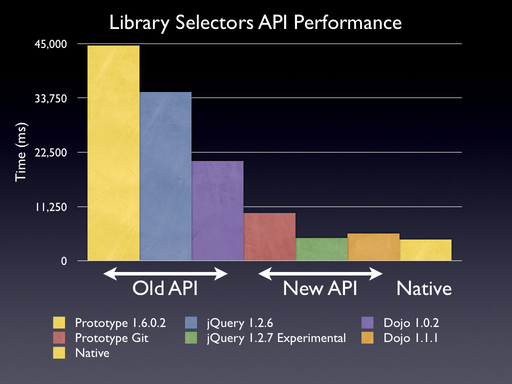The Selectors API recommendation, published by the W3C, is a relatively new effort that gives JavaScript developers the ability to find DOM elements on a page using CSS selectors. This single API takes the complicated process of traversing and selecting elements from the DOM and unifies it under a simple unified interface.
Out of all the recent work to come out of the standards process this is one of the better-supported efforts across all browsers: Usable today in Internet Explorer 8, Chrome, and Safari and arriving in Firefox 3.5 and Opera 10.
Using querySelectorAll
The Selectors API provides two methods on all DOM documents, elements, and fragments: querySelector and querySelectorAll. The methods work virtually identically, they both accept a CSS selector and return the resulting DOM elements (the exception being that querySelector only returns the first element).
For example, given the following HTML snippet:
First paragraph.
Second paragraph.
We would be able to use querySelectorAll to make the background of all the paragraphs, inside the div with the ID of ‘id’, red.
var p = document.querySelectorAll("#id p");
for ( var i = 0; i < p.length; i++ ) {
p[i].style.backgroundColor = "red";
}
Or we could find the first child paragraph of a div that has a class of 'class' and give it a class name of 'first'.
document.querySelector("div.class > p:first-child")
.className = "first";
Normally these types of traversals would be very tedious in long-form JavaScript/DOM code, taking up multiple lines and queries each.
While the actual use of the Selectors API methods is relatively simple (each taking a single argument) the challenging part comes in when choosing which CSS selectors to use. The Selectors API taps in to the native CSS selectors provided by the browser, for use in styling elements with CSS. For most browsers (Firefox, Safari, Chrome, and Opera) this means that you have access to the full gamut of CSS 3 selectors. Internet Explorer 8 provides a more-limited subset that encompasses CSS 2 selectors (which are still terribly useful).
The biggest hurdle, for most new users to the Selectors API, is determining which CSS selectors are appropriate for selecting the elements that you desire - especially since most developers who write cross-browser code only have significant experience with a limited subset of fully-working CSS 1 selectors.
While the CSS 2 and CSS 3 selector specifications can serve as a good start for learning more about what's available to you there also exist a number of useful guides for learning more:
- CSS 3 Selectors Explained
- XML.com: CSS 3 Selectors
- jQuery Selector Reference (Note: Also includes custom, non-standard, selectors.)
Implementations in the Wild
The most compelling use case of the Selectors API is not its direct use by web developers, but its use by 3rd-party libraries that already provide DOM CSS selector functionality. The trickiest problem towards adopting the use of the Selectors API, today, is that it isn't available in all browsers that users develop for (this includes IE 6, IE 7 and Firefox 3). Thus, until those browsers are no longer used, we must use some intermediary utility to recreate the full DOM CSS selector experience.
Thankfully, a number of libraries already exist that provide an API compatible with the Selectors API (in fact, much of the inspiration for the Selectors API comes from the existence of these libraries in the first place). Additionally, many of these implementations already use the Selectors API behind the scenes. This means that you can use using DOM CSS selectors in all browsers that you support AND get the benefit of faster performance from the native Selectors API implementation, with no work to you.
Some existing implementations that gracefully use the new Selectors API are:
It's important to emphasize the large leap in performance that you'll gain from using this new API (in comparison to the traditional mix of DOM and JavaScript that you must employ). You can really see the difference when you look at the improvement that occurred when JavaScript libraries began to implement the new Selectors API.
When some tests were run previously the results were as follows:
You can see the dramatic increase in performance that occurred once the libraries began using the native Selectors API implementations - it's quite likely that this performance increase will happen in your applications, as well.
Test Suite
To coincide with the definition of the Selectors API specification a Selectors API test suite was created by John Resig of Mozilla. This test suite can be used as a way to determine the quality of the respective Selectors API implementations in the major browsers.
The current results for the browsers that support the API are:
- Firefox 3.5: 99.3%
- Safari 4: 99.3%
- Chrome 2: 99.3%
- Opera 10b1: 97.5%
- Internet Explorer 8: 47.4%
Internet Explorer 8, as mentioned before, is missing most CSS 3 selectors - thus failing most of the associated tests.
As it stands, the Selectors API should serve as a simple, and fast, way of selecting DOM elements on a page. It's already benefiting those who use JavaScript libraries that provide similar functionality so feel free to dig in today and give the API a try.



18 comments